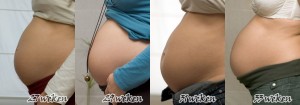Pregnancy is proclaimed as a time of celebration and joy at the forthcoming new life being nurtured and expected to make an appearance at the end of the pregnancy. Sadly though, every woman is also aware that pregnancy is a time when her body will go through great physical change and that growing another human being inside your body can have unique discomforts that only another pregnant woman can truly appreciate or understand. Nonetheless, despite this advance knowledge, women throughout the centuries have still become pregnant, sometimes multiple times. They share how to endure or prevent the discomforts of pregnancy with each other sometimes mom to daughter and other times mom-to-mom. The discomforts of pregnancy are written in books, in magazines, and available on websites. Movies illustrate the discomforts of pregnancy and now, so do this article.
Each woman’s pregnancy varies from another’s and even each pregnancy that the same woman may have can also be different. Common discomforts can be shared but giving certain continuity to pregnancy and, of course, many opportunities to swap stories and give out pointers. Some of the most talked about discomforts of pregnancy include breast changes, back pain, headaches, constipation, dizziness, heartburn, hemorrhoids, insomnia, leg cramps, morning sickness, round ligament pain, sciatic nerve pain, skin changes, swelling, and dental and mouth issues.
Back pain is a very common complaint of women during pregnancy. In general, 80% of those who are pregnant will experience and talk about back pain. A pregnant woman can experience back pain in many different locations including the pelvic region, the coccyx (tailbone), the pubic symphysis anterior, the groin area, and the upper legs nearest the buttock and pelvis. The famous waddling gait of posture or pregnancy is often the two culprits blamed for back pain.
Breast changes, especially early in pregnancy, can cause discomfort that often is a telltale sign that the woman is pregnant. This includes tenderness and hypersensitivity of the nipples or breast tissue, growth and enlargement of breast tissue and of the nipples which can become more pronounced.
Constipation is a pregnancy discomfort that can be embarrassing. Constipation can cause abdominal discomfort due to difficult passage of stool that has hardened. There are many factors that contribute to constipation in pregnancy including worry, anxiety, and lack of adequate physical exercise, low-fiber diet, and pregnancy hormones. Pregnant women also consume prenatal vitamins that often contain mineral and iron which can contribute to constipation.
Nothing destroys the joy of pregnancy more than a nagging or a persistent headache. Pregnant women tend to suffer headaches more during the first trimester and then again during the third trimester. Many things including the famous lack of sleep due to size of the abdomen or activity of the unborn baby, dehydration, stress, low blood sugar, and also caffeine withdrawal if the woman is trying to cut down or avoid caffeine during pregnancy can cause headaches during pregnancy.
Leg cramps are common in pregnancy due to the fact that the additional weight gain and the changes in circulation and the pressure of the baby on certain nerves and blood vessels that go down to the legs can all add up to pinching or pressure that can be the source of leg cramping. If the woman exercises on a regular basis, massages or has her legs massaged for her, takes frequent rests with her legs up, or can wear supportive stockings, she can hope to avoid some of the leg cramping.
Gums can become swollen and become more susceptible to bleeding while pregnant and the mom-to-be can easily get gingivitis because of the hormonal changes that cause blood flow to increase to many parts of her body including her mouth. It is recommended to make a visit to the dentist as part of her pre-pregnancy health check to ensure that everything is healthy with her gums and mouth and to reinforce good dental habits if necessary. She is at risk for pregnancy gingivitis particularly in the second trimester of pregnancy so a healthy mouth before pregnancy will increase her chances for minimum dental discomforts during her pregnancy.
Filed under: Pregnancy
